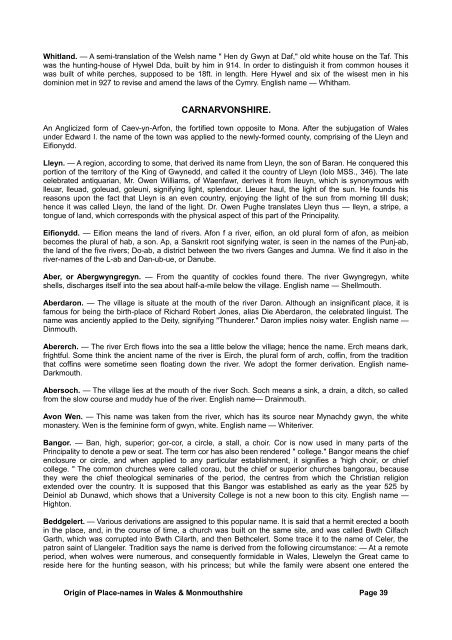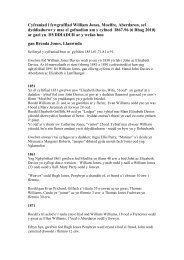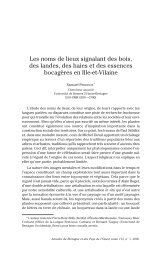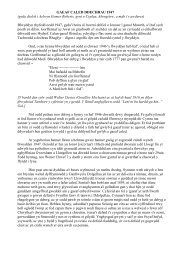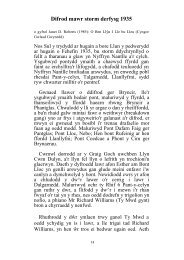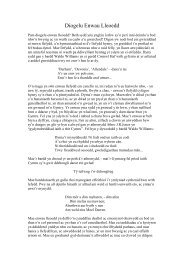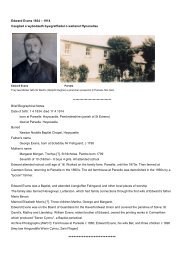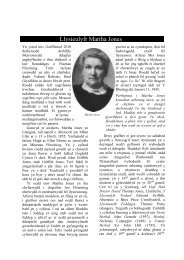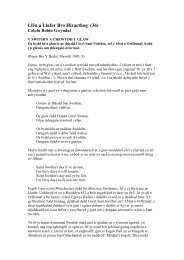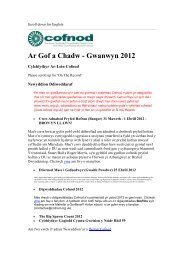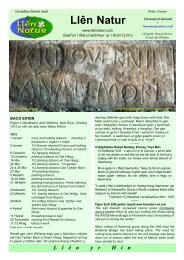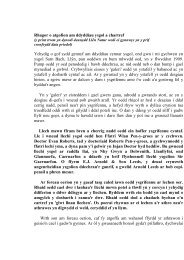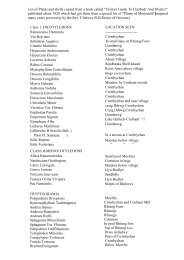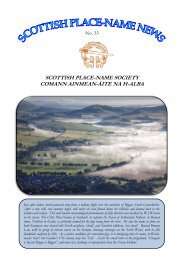Whitl<strong>and</strong>. — A semi-translation <strong>of</strong> <strong>the</strong> Welsh name " Hen dy Gwyn at Daf," old white house on <strong>the</strong> Taf. Thiswas <strong>the</strong> hunt<strong>in</strong>g-house <strong>of</strong> Hywel Dda, built by him <strong>in</strong> 914. In order to dist<strong>in</strong>guish it from common houses itwas built <strong>of</strong> white perches, supposed to be 18ft. <strong>in</strong> length. Here Hywel <strong>and</strong> six <strong>of</strong> <strong>the</strong> wisest men <strong>in</strong> hisdom<strong>in</strong>ion met <strong>in</strong> 927 to revise <strong>and</strong> amend <strong>the</strong> laws <strong>of</strong> <strong>the</strong> Cymry. English name — Whitham.CARNARVONSHIRE.An Anglicized form <strong>of</strong> Caev-yn-Arfon, <strong>the</strong> fortified town opposite to Mona. After <strong>the</strong> subjugation <strong>of</strong> Walesunder Edward I. <strong>the</strong> name <strong>of</strong> <strong>the</strong> town was applied to <strong>the</strong> newly-formed county, compris<strong>in</strong>g <strong>of</strong> <strong>the</strong> Lleyn <strong>and</strong>Eifionydd.Lleyn. — A region, accord<strong>in</strong>g to some, that derived its name from Lleyn, <strong>the</strong> son <strong>of</strong> Baran. He conquered thisportion <strong>of</strong> <strong>the</strong> territory <strong>of</strong> <strong>the</strong> K<strong>in</strong>g <strong>of</strong> Gwynedd, <strong>and</strong> called it <strong>the</strong> country <strong>of</strong> Lleyn (Iolo MSS., 346). The latecelebrated antiquarian, Mr. Owen Williams, <strong>of</strong> Waenfawr, derives it from lleuyn, which is synonymous withlleuar, lleuad, goleuad, goleuni, signify<strong>in</strong>g light, splendour. Lleuer haul, <strong>the</strong> light <strong>of</strong> <strong>the</strong> sun. He founds hisreasons upon <strong>the</strong> fact that Lleyn is an even country, enjoy<strong>in</strong>g <strong>the</strong> light <strong>of</strong> <strong>the</strong> sun from morn<strong>in</strong>g till dusk;hence it was called Lleyn, <strong>the</strong> l<strong>and</strong> <strong>of</strong> <strong>the</strong> light. Dr. Owen Pughe translates Lleyn thus — lleyn, a stripe, atongue <strong>of</strong> l<strong>and</strong>, which corresponds with <strong>the</strong> physical aspect <strong>of</strong> this part <strong>of</strong> <strong>the</strong> Pr<strong>in</strong>cipality.Eifionydd. — Eifion means <strong>the</strong> l<strong>and</strong> <strong>of</strong> rivers. Afon f a river, eifion, an old plural form <strong>of</strong> afon, as meibionbecomes <strong>the</strong> plural <strong>of</strong> hab, a son. Ap, a Sanskrit root signify<strong>in</strong>g water, is seen <strong>in</strong> <strong>the</strong> <strong>names</strong> <strong>of</strong> <strong>the</strong> Punj-ab,<strong>the</strong> l<strong>and</strong> <strong>of</strong> <strong>the</strong> five rivers; Do-ab, a district between <strong>the</strong> two rivers Ganges <strong>and</strong> Jumna. We f<strong>in</strong>d it also <strong>in</strong> <strong>the</strong>river-<strong>names</strong> <strong>of</strong> <strong>the</strong> L-ab <strong>and</strong> Dan-ub-ue, or Danube.Aber, or Abergwyngregyn. — From <strong>the</strong> quantity <strong>of</strong> cockles found <strong>the</strong>re. The river Gwyngregyn, whiteshells, discharges itself <strong>in</strong>to <strong>the</strong> sea about half-a-mile below <strong>the</strong> village. English name — Shellmouth.Aberdaron. — The village is situate at <strong>the</strong> mouth <strong>of</strong> <strong>the</strong> river Daron. Although an <strong>in</strong>significant <strong>place</strong>, it isfamous for be<strong>in</strong>g <strong>the</strong> birth-<strong>place</strong> <strong>of</strong> Richard Robert Jones, alias Die Aberdaron, <strong>the</strong> celebrated l<strong>in</strong>guist. Thename was anciently applied to <strong>the</strong> Deity, signify<strong>in</strong>g "Thunderer." Daron implies noisy water. English name —D<strong>in</strong>mouth.Abererch. — The river Erch flows <strong>in</strong>to <strong>the</strong> sea a little below <strong>the</strong> village; hence <strong>the</strong> name. Erch means dark,frightful. Some th<strong>in</strong>k <strong>the</strong> ancient name <strong>of</strong> <strong>the</strong> river is Eirch, <strong>the</strong> plural form <strong>of</strong> arch, c<strong>of</strong>f<strong>in</strong>, from <strong>the</strong> traditionthat c<strong>of</strong>f<strong>in</strong>s were sometime seen float<strong>in</strong>g down <strong>the</strong> river. We adopt <strong>the</strong> former derivation. English name-Darkmouth.Abersoch. — The village lies at <strong>the</strong> mouth <strong>of</strong> <strong>the</strong> river Soch. Soch means a s<strong>in</strong>k, a dra<strong>in</strong>, a ditch, so calledfrom <strong>the</strong> slow course <strong>and</strong> muddy hue <strong>of</strong> <strong>the</strong> river. English name— Dra<strong>in</strong>mouth.Avon Wen. — This name was taken from <strong>the</strong> river, which has its source near Mynachdy gwyn, <strong>the</strong> whitemonastery. Wen is <strong>the</strong> fem<strong>in</strong><strong>in</strong>e form <strong>of</strong> gwyn, white. English name — Whiteriver.Bangor. — Ban, high, superior; gor-cor, a circle, a stall, a choir. Cor is now used <strong>in</strong> many parts <strong>of</strong> <strong>the</strong>Pr<strong>in</strong>cipality to denote a pew or seat. The term cor has also been rendered " college." Bangor means <strong>the</strong> chiefenclosure or circle, <strong>and</strong> when applied to any particular establishment, it signifies a 'high choir, or chiefcollege. " The common churches were called corau, but <strong>the</strong> chief or superior churches bangorau, because<strong>the</strong>y were <strong>the</strong> chief <strong>the</strong>ological sem<strong>in</strong>aries <strong>of</strong> <strong>the</strong> period, <strong>the</strong> centres from which <strong>the</strong> Christian religionextended over <strong>the</strong> country. It is supposed that this Bangor was established as early as <strong>the</strong> year 525 byDe<strong>in</strong>iol ab Dunawd, which shows that a University College is not a new boon to this city. English name —Highton.Beddgelert. — Various derivations are assigned to this popular name. It is said that a hermit erected a booth<strong>in</strong> <strong>the</strong> <strong>place</strong>, <strong>and</strong>, <strong>in</strong> <strong>the</strong> course <strong>of</strong> time, a church was built on <strong>the</strong> same site, <strong>and</strong> was called Bwth CilfachGarth, which was corrupted <strong>in</strong>to Bwth Cilarth, <strong>and</strong> <strong>the</strong>n Bethcelert. Some trace it to <strong>the</strong> name <strong>of</strong> Celer, <strong>the</strong>patron sa<strong>in</strong>t <strong>of</strong> Llangeler. Tradition says <strong>the</strong> name is derived from <strong>the</strong> follow<strong>in</strong>g circumstance: — At a remoteperiod, when wolves were numerous, <strong>and</strong> consequently formidable <strong>in</strong> Wales, Llewelyn <strong>the</strong> Great came toreside here for <strong>the</strong> hunt<strong>in</strong>g season, with his pr<strong>in</strong>cess; but while <strong>the</strong> family were absent one entered <strong>the</strong>Orig<strong>in</strong> <strong>of</strong> Place-<strong>names</strong> <strong>in</strong> Wales & Monmouthshire Page 39
house, <strong>and</strong> attempted to kill an <strong>in</strong>fant enjoy<strong>in</strong>g his sleep <strong>in</strong> <strong>the</strong> cradle. The faithful greyhound named Gelert,<strong>in</strong> whose care <strong>the</strong> chiId doubtless was entrusted, seized <strong>the</strong> animal <strong>and</strong>, after a severe struggle, killed it. In<strong>the</strong> struggle <strong>the</strong> cradle was overturned, <strong>and</strong> revealed both <strong>the</strong> wolf <strong>and</strong> child. On <strong>the</strong> pr<strong>in</strong>ce's com<strong>in</strong>g <strong>the</strong><strong>in</strong>fant, <strong>and</strong> observ<strong>in</strong>g <strong>the</strong> dog's maw awash with blood, he rashly jumped to <strong>the</strong> conclusion it, Gelert hadkilled <strong>the</strong> child, <strong>and</strong>, <strong>in</strong> a rage, drew his sword, <strong>and</strong> buried it <strong>in</strong> <strong>the</strong> faithful animal ; but how great was hissadness when, on replac<strong>in</strong>g <strong>the</strong> cradle, he found it<strong>and</strong> <strong>the</strong> child alive. He, however, caused Gelert to behonourably <strong>in</strong>terred, <strong>and</strong>, as a tribute tohis memory, erected a church on this spot <strong>of</strong>fer<strong>in</strong>g to God for <strong>the</strong>preservation <strong>of</strong> his soul <strong>and</strong> held contiguous to <strong>the</strong> churchyard are two gravestones overhung with bushes,which po<strong>in</strong>t out <strong>the</strong> rest<strong>in</strong>g <strong>place</strong> <strong>of</strong> Gelert, <strong>and</strong> a rustic seat is <strong>place</strong>d near, that I may recl<strong>in</strong>e <strong>and</strong> meditate<strong>the</strong> legend. The name means <strong>the</strong> " grave <strong>of</strong> Celert ap Llewelyn, descendant <strong>of</strong> one <strong>of</strong> <strong>the</strong> Irish pr<strong>in</strong>ces thatcame from that country about <strong>the</strong> beg<strong>in</strong>n<strong>in</strong>g <strong>of</strong> <strong>the</strong> fourth century. English name— Gelert's Grave.?????. — Its ancient name was Cilfoden. Its name is derived from Be<strong>the</strong>sda, <strong>the</strong> name <strong>of</strong> a ???il chapelbuilt <strong>in</strong> <strong>the</strong> <strong>place</strong> <strong>in</strong> 1819. An attempt recently made to ab<strong>and</strong>on <strong>the</strong> Scriptural <strong>in</strong>terpretation named it " GlanOgwen," after <strong>the</strong> new church nearby <strong>of</strong> Penrhyn, but it proved unsuccessful.Bettws-y-Coed. — Bettws is a Welshified form <strong>of</strong> house <strong>of</strong> prayer, a monkish <strong>in</strong>stitution <strong>of</strong> churches, built,perhaps, on or near <strong>the</strong> site that perpetuate <strong>the</strong> name <strong>of</strong> Bettws. It derives its name from an ancientreligious ???fed Bettws Wyrion Iddon, <strong>the</strong> bead-house ??? p <strong>of</strong> Iddon. Bettws <strong>in</strong> Welsh means a prayer <strong>and</strong>comfort. William Llyn writes :— ?????m yr owan i Fettws, hyny yw, lie cynhesCaer Rhun. — Rhun, <strong>the</strong> son <strong>of</strong> Maelgwyn Gwynedd, <strong>and</strong> a pr<strong>in</strong>ce <strong>of</strong> <strong>the</strong> sixth century, who took: up hisabode <strong>in</strong> <strong>the</strong> Roman Conovium; hence <strong>the</strong> name* English name — Gr<strong>and</strong>fort.Capel Curig. — Capel, chapel; Curig, <strong>the</strong> name <strong>of</strong> <strong>the</strong> son <strong>of</strong> Hid or Julitta, who flourished <strong>in</strong> <strong>the</strong> seventhcentury. The church was dedicated to Curig <strong>and</strong> his mo<strong>the</strong>r. English name— Curig's Chapel.Carn Giwch. — Cam, a heap. On <strong>the</strong> summit <strong>of</strong> a hill close by, called Mod Cam Ciwch, <strong>the</strong>re is a large heap<strong>of</strong> loose stones, supposed to have been raised to Ciwch, a British sa<strong>in</strong>t <strong>of</strong> an early period. English name—Heapham.Clwtybont. — Clwt, a portion; " clwt o dir" a piece <strong>of</strong> l<strong>and</strong>; y, <strong>the</strong>; bont-pont, bridge; signify<strong>in</strong>g a piece <strong>of</strong> l<strong>and</strong>near a bridge. English name — Bridgel<strong>and</strong>.Clynog. — A corruption <strong>of</strong> Celynog, a <strong>place</strong> overrun with hollywood. It is situated <strong>in</strong> a small grove near <strong>the</strong>shore, on a pla<strong>in</strong> near <strong>the</strong> base <strong>of</strong> <strong>the</strong> hill. English name — Hollyham.Colwyn. — Some derive <strong>the</strong> name from Colwyn, <strong>the</strong> name <strong>of</strong> <strong>the</strong> chief shepherd <strong>of</strong> Bran ab Llyr Lledfaith.O<strong>the</strong>rs th<strong>in</strong>k it is a compound <strong>of</strong> cau, hollow, enclosed; <strong>and</strong> llwyn, a grove, a bush, from <strong>the</strong> deep brooks <strong>and</strong>encircl<strong>in</strong>g groves <strong>in</strong> <strong>the</strong> district. English name — Grovebrook.Conway. — The town <strong>of</strong> Conway was built on <strong>the</strong> north side <strong>of</strong> <strong>the</strong> river by Maelgwyn Gwynedd, <strong>in</strong> 581, <strong>and</strong>was called Caer Gyff<strong>in</strong>, which signifies <strong>the</strong> border fortress. Conwy is <strong>the</strong> present Welsh name, taken from <strong>the</strong>name <strong>of</strong> <strong>the</strong> river, which signifies <strong>the</strong> chief water. Some philologists derive <strong>the</strong> name from ca<strong>in</strong>, fair, f<strong>in</strong>e,beautiful; <strong>and</strong> wy, water. Conwy <strong>and</strong> Ca<strong>in</strong>wy are equally applicable to this beautiful river. From gwy or wy,water, most <strong>of</strong> <strong>the</strong> Welsh rivers derive <strong>the</strong>ir <strong>names</strong>. For <strong>in</strong>stance, Llugwy, clear water; Elwy y glid<strong>in</strong>g water;<strong>and</strong> <strong>the</strong> above, Conwy, chief water, or Ca<strong>in</strong>wy, fair or f<strong>in</strong>e water. The site <strong>of</strong> Conway Castle was ancientlycalled Cannock, from cann, white, fair, clear, <strong>and</strong> oich, water. English name — Fairwater.Criccieth. — Pennant spells it Crickaeth, " The Myvyrian" Cruciaith, <strong>and</strong> o<strong>the</strong>rs Crug -earth. Some th<strong>in</strong>k it isa compound <strong>of</strong> crug, a heap, a hillock, <strong>and</strong> aeth, sorrow, pa<strong>in</strong> ; signify<strong>in</strong>g a frightful or formidable promontory.O<strong>the</strong>rs say it is Crug-caeth* <strong>the</strong> narrow hill. Perhaps it is a compound <strong>of</strong> craig aeth, signify<strong>in</strong>g <strong>the</strong> awful rock.English name — Frethill.Croesor. — A narrow comb <strong>in</strong> Blaenau Nanmor. Tradition says that Elen Lueddog was on her journeyhomewards when, on hear<strong>in</strong>g <strong>the</strong> sad news <strong>of</strong> her son's death, she sorrowfully exclaimed, " Croesawr i mi— i.e. 9 " an hour <strong>of</strong> adversity to me' <strong>and</strong> <strong>the</strong> <strong>place</strong> was called Croesawr or Croesor from that sorrowfulcircumstance. English name — Griefham.Crynant. — Cry, a. corruption <strong>of</strong> crai, a word imply<strong>in</strong>g a narrow <strong>place</strong>; crai'r nodwydd, <strong>the</strong> eye <strong>of</strong> <strong>the</strong> needle;nant, a brook. The old <strong>in</strong>habitants spell it Cra<strong>in</strong>ant, <strong>and</strong> a bridge that spans Nant-y-Bettws is called Pont-yOrig<strong>in</strong> <strong>of</strong> Place-<strong>names</strong> <strong>in</strong> Wales & Monmouthshire Page 40
- Page 1 and 2: HANDBOOK OF THE ORIGIN OF PLACE-NAM
- Page 3 and 4: § § § § §The Author begs to st
- Page 5 and 6: pitiful cries of the railway offici
- Page 7 and 8: Bishop Percy says that "in England,
- Page 9 and 10: The city of Chester is still popula
- Page 11 and 12: There's Cumwhitton, Cumwhinton, Cum
- Page 13 and 14: Llwyn in its primary' sense means a
- Page 15 and 16: PLACE-NAMES IN WALES.Wales. — The
- Page 17 and 18: Church are generally dedicated to e
- Page 19 and 20: think he was a contemporary of St.
- Page 21 and 22: Rhosbeirio. — Rhos, a moor, a dry
- Page 23 and 24: of Brecknock," states that this vic
- Page 25 and 26: Cam cnwir ef Cwmdu,Cwm gwyn yw & n
- Page 27 and 28: Penderyn. — A corruption probably
- Page 29 and 30: Ardudwy. — Ar, upon or above; tud
- Page 31 and 32: to mark its pre-eminence over the o
- Page 33 and 34: Some think that eirw is a corruptio
- Page 35 and 36: present form — Caerfyrddin.Abergw
- Page 37 and 38: place of refuge; hence the name. En
- Page 39 and 40: Llansawyl. — The church was dedic
- Page 41: eject. The village took its name fr
- Page 45 and 46: Gwydir. — Prima facie one may tak
- Page 47 and 48: Nefyn. — The church was probably
- Page 49 and 50: DENBIGHSHIRE.Anglicized form of Din
- Page 51 and 52: Llangollen. — From Collen, a sain
- Page 53 and 54: hands into their pockets to pay a c
- Page 55 and 56: Cefn. — The name signifies a ridg
- Page 57 and 58: Maesgarmon. — Named in honour of
- Page 59 and 60: Abertridwr. — Tridwr, three water
- Page 61 and 62: it is said, was originally built by
- Page 63 and 64: Cwmllynfell. — Cwm, a narrow vale
- Page 65 and 66: Gwarycaeau. — Gwdr, the nape of t
- Page 67 and 68: means a cultivated region, a vale,
- Page 69 and 70: Penrhiwfer.- Pen, head, top; rhiw,
- Page 71 and 72: Port Talbot. — So called in 1835
- Page 73 and 74: Trealaw. — This appellation was g
- Page 75 and 76: Aberdyfi. — So called from its si
- Page 77 and 78: Llanddwywe. — From Dwywau, a desc
- Page 79 and 80: Crickhowell and some in the directi
- Page 81 and 82: Griffithstown. — This village was
- Page 83 and 84: and gwy, water. Treiddiod troth tna
- Page 85 and 86: derive Tintern from din, fortified
- Page 87 and 88: Caersws. — It appears that the Ro
- Page 89 and 90: English name — Ervylton.Llanymech
- Page 91 and 92: Angle. — Probably from the angle-
- Page 93 and 94:
Gellyswick. — Another hybrid. Gel
- Page 95 and 96:
that the two rivers in their flowin
- Page 97 and 98:
ecame the bishop of the see, and wa
- Page 99 and 100:
earth formerly stood on a summit on
- Page 101 and 102:
Pilleth. — A corruption of pwll,
- Page 103 and 104:
Howells, Rev. J., Mountain AshHowel
- Page 105 and 106:
Williams, D., PenywernWilliams, Rev


